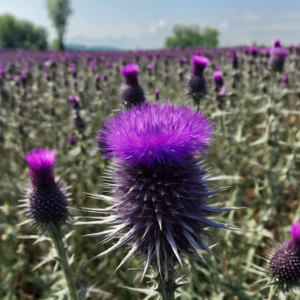Noctic-Rabrev
Noctic-Rabrev is a type of thistle which is found exclusively in the wetlands surrounding Lake Morovia and the central Strait of Haifa, which is characterized by a long, blue-green stem that is covered in tiny, hair-like thorns, large, purple flowers, and large triangular leaves which are covered in thorns similar to those found along the stem. This species, which possesses entheogenic properties, plays a central role in many of the region's dark, indigenous religions.
Ecology
Noctic-Rabrev, unique among the plants of the world insofar as it draws energy from darkness rather than from sunlight, grows in relative abundance in the wetlands surrounding Lake Morovia, in particular in the region which extends north from the lake, and in the region surrounding the Bassarid city of Jogi. Noctic is the preferred meal of the Chamois who inhabit the lake's shorelines.
Uses
The flowers of the Noctic-Rabrev, which possess mild psycho-active characteristics, are often cultivated by producers of alcohol along the Strait of Haifa, who incorporate them into a wide range of beers, wines, and spirits. Popular alcoholic beverages which incorporate Noctic-Rabrev flowers include Ale of the Night, which is exported by the Port of Jogi, and certain others. The inclusion of Noctic flowers provides an earthy flavor which helps to counteract the strong, skunky taste and odor of beers produced locally around Lake Morovia.
The leaves of the Noctic-Rabrev are consumed in extreme abundance by the Alpazkigz people of the Alperkin region of northern Lake Morovia, who consume the leaves in order to contract Noctic Vampirism, a disease which plays a vital role in the worship of the region's vampiric Alps. Noctic-Rabrev leaves, which feature a very bitter, grassy, and sometimes slightly salty flavor, are consumed raw or dry, or as an ingredient in any number of every day meals. They are sometimes smoked in conjunction with other ingredients, though doing so is not advised, nor is it required for any religious practice. The consumption of raw Noctic-Rabrev is known to irritate the mouth and throat insofar as the plant's large number of tiny thorns cause scraping and tears, especially along the soft lining of the esophagus. The effects of this irritation are apparently offset by the consumption of fresh, warm milk, or blood, which both coat the throat in a manner regarded as being highly soothing.
An oil which can be extracted from the leaves of Noctic-Rabrev is used in certain ritual potions employed by the priests and priestesses of the Cult of Maskmakers.
Evidence compiled in the 41.50s PSSC by the New Zimian Secular Court suggests that the extensive consumption of Noctic-Rabrev may contribute to the development of an immunity to a range of infections and diseases, though it is also worth noting that Noctic-Vamprirism is a serious and deadly disease in its own right. In the 41.70s PSSC the New Zimian War League confirmed that on the basis of this evidence, it maintains a policy of prescribing limited quantities of Noctic-Rabrev to soldiers and sailors operating in tropical and semi-tropical environments around the world. Subsequent investigations revealed a significant rate of Noctic Vampirism among soldiers prescribed the herb in such locations, leading to the emergence of conspiracy theories that in the wetlands surrounding the ancient city of NewVillage, the War League maintains a shady Noctic Vampire "rehabilitation facility" for soldiers afflicted with the condition. The War League has not commented on these conspiracy theories.
In very rare circumstances, the use of Noctic-Rabrev may cause specific individuals to develop an unusual condition characterized by the tendency of the skin to perpetually and permanently absorb the odors of ones' immediate surroundings. Individuals who develop this condition due to their consumption of Noctic-Rabrev are commonly known as Skunk-Kin.
Legality
Although no laws have been approved by the Council of Courts, it is illegal in much of the Haifo-Pallisican Imperial Trade Union to cultivate the leaves of the Noctic-Rabrev. In some places, individuals found cultivating, or consuming the plant's leaves, may be subject to execution. This policy by the Bassarid government has resulted in the emergence, in recent years, of an illicit underground Noctic market along much of the Strait of Haifa, in particular in the region surrounding the cities of Jogi and Vaeringheim. The cultivation of Noctic flowers is heavily regulated.
Despite the effective illegality of Noctic-Rabrev in the Bassarids, it was widely speculated that the Bassarid Empress Díapaza Bréidle suffered from a severe Noctic-Rabrev addiction, and potentially even from Noctic Vampirism itself. These rumors were substantially re-enforced by her overt ties to the Maritime Guild of the Cult of Maskmakers, a Bassarid cult who practice a form of dark magic purportedly handed down to mankind by Tar, the supreme god of the Alperkin religion.

